An assortment of keys from Germany, which includes keys from Prussia and Austria. Early keys used interesting camelback designs as well as ruggedly-built straight lever designs. In the US, instrument makers stopped making camelbacks in the latter part of the 1800's, but German camelbacks continued to be made into the 20th Century, which often fools collectors into thinking their camelback key is very early when in reality it might have been made in the early 1900's.
 |
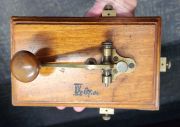 |
 |
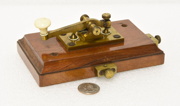 |
| Very Early Austrian Camelback by Johann Ekling, Vienna. Ca.1850's |
Top View of the Ekling Camelback Key |
Another Very Early Austrian Camelback Key by Johann Ekling. Ca. 1850's |
Small Austrian Camelback Key. Johann Leopolder, Vienna. Ca. Late 1850's |
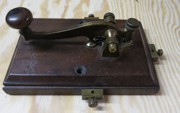 |
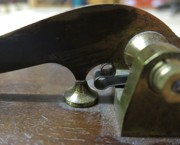 |
 |
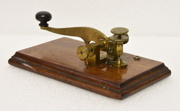 |
| Early Austrian Camelback, Ca. 1860 |
Close-up of the Contact & Spring |
Early German Made Camelback. Note the Coiled Spring Instead of a Strap Spring Common on Later Keys. Ca. 1860's |
Rear View of the German Camelback Showing the Spring |
 |
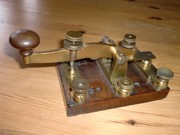 |
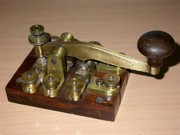 |
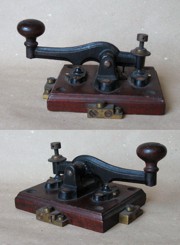 |
| An Early German Duplex Key. Maker Unknown. Ca. 1870 |
German Straight Lever Key. 1872 |
Early German Camelback, Ca. 1870's |
Early German Cast Iron Camelback |
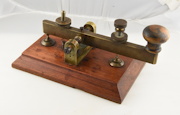 |
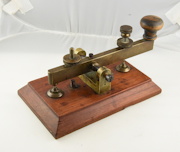 |
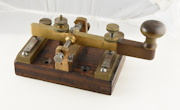 |
 |
| Early German Postal Key. Maker Unknown. Ca. 1870's |
Another View of the Early German Postal Key |
Early German Postal Key. This Style Key Was Made from the Mid-1870's Until Around 1920 |
Side View of the German Postal Key Showing the Maker's Name, L.E. Schwerdt, Carlsruhe |
 |
 |
 |
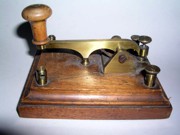 |
| The Schwerdt Postal Key Also Has the Date of Manufacture Stamped on it: April 12, 1876 |
Early German Key With Step-Lever Design. Maker Unknown. Ca. 1880 |
Another View of the German Step-Lever Key |
Early German Postal Key. (w1tp.com) |
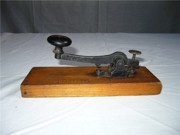 |
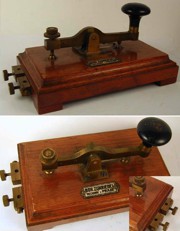 |
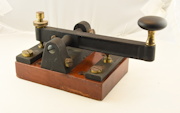 |
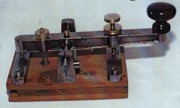 |
| Another German Cast Iron Camelback Key |
Prussian Camelback by Zukriebel, Prague |
German "I-Beam" Lever Key, Ca. 1880's. It is Called an I-Beam Key Because a Cross Section of the Lever Looks Like the Letter "I" |
Another German I-Beam Key by Gurlt |
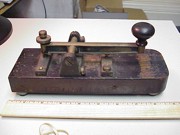 |
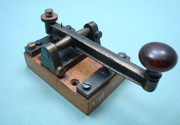 |
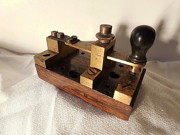 |
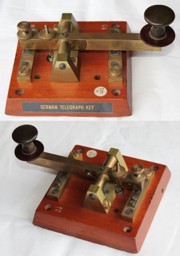 |
| Another I-Beam Key. Maker Unknown |
One More German I-Beam Key |
German Strap Key by Groos & Graf, 1898 |
Early German Straight Lever Postal Key |
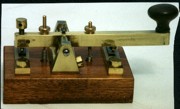 |
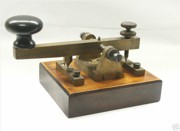 |
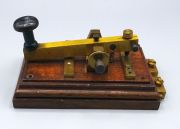 |
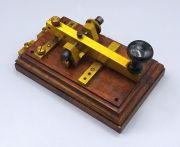 |
| Siemens & Halske Postal Key With 2 Spring Adjustments |
Another German Landline Key. Maker Unknown |
An Early German or Austrian Straight Lever Postal Style Key |
Another View of the German-Austrian Key |
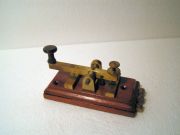 |
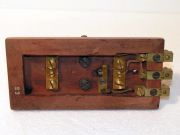 |
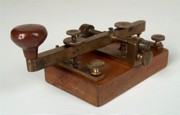 |
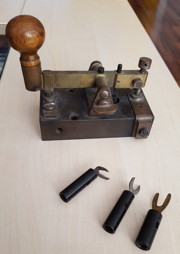 |
| Unknown Austrian Postal Key |
The Underside of the Austrian Postal Key |
Another Unknown German Landline Key |
Another Unknown German Landline Key |
 |
 |
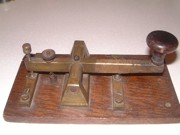 |
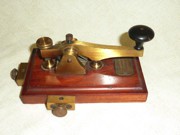 |
| Early Landline Key by Groos & Graf, 1895 |
Front View of the Groos & Graf Key Showing the Date Stamp |
One More Unknown Landline Key |
Miniature Prussian Camelback Key |
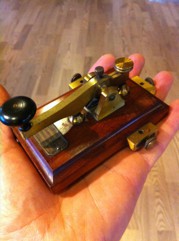 |
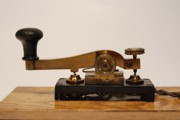 |
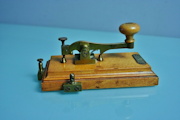 |
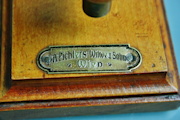 |
| Another View of the Miniature Camelback |
Austrian Camelback Key, Ca. Early 1900's |
Prussian Camelback Key by Pichler, Ca. Early 1900's |
Close-Up of the Pichler Nameplate |
 |
 |
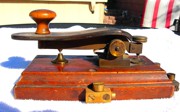 |
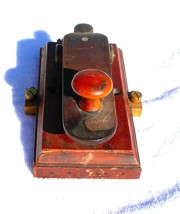 |
| German Postal Key by Philips. Early 1900s |
Close-Up of the Philips Nameplate |
Camelback Key With Lever Shroud |
Top View Showing the Lever Shroud |
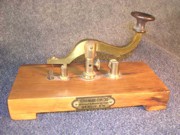 |
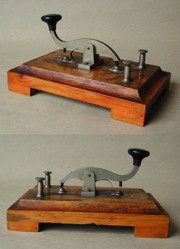 |
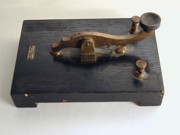 |
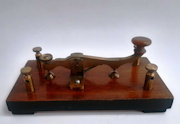 |
| German Camelback Key For Demonstration Use. Made by Ferdinand Ernecke, Berlin |
Demo Camelback 2 |
Demo Camelback 3 |
Demo Camelback 4 |
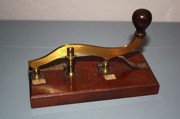 |
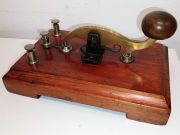 |
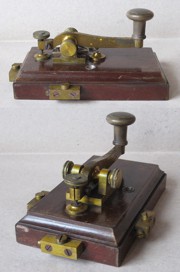 |
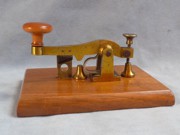 |
| Demo Camelback 5 |
Demo Camelback 6 |
Prussian Camelback Key. Ca. Early 1900's |
German Postal Style Key That is Actually a Cigar Cutter !! |
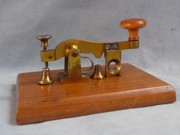 |
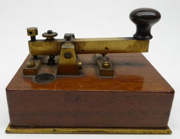 |
 |
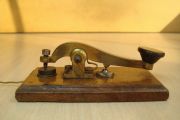 |
| Another View of the Cigar Cutter Key |
Another Cigar Cutter Key |
Close-Up of the Cutting Blades |
Very Small German Camelback Key |
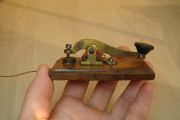 |
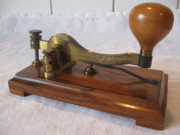 |
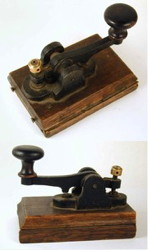 |
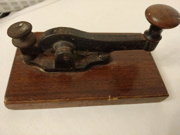 |
| Holding the Camelback Key in the Hand to Show its Small Size |
Another Interesting German Camelback Key |
Small Cast Iron Camelback. Probably a "dummy" key used for code practice since it has no connections for wires. |
Another version of the "dummy" key |
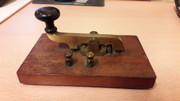 |
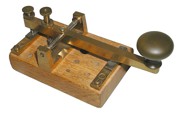 |
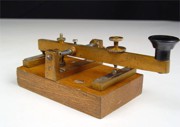 |
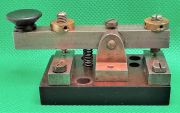 |
| Unknown Key, Possibly German |
German Postal Key |
Another German Postal Key |
A Small but Stock German Key. Maker Unknown. Looks Like a Spark Key, but the Contacts are too Small |
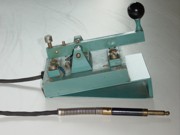 |
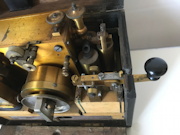 |
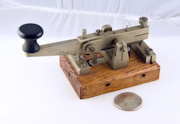 |
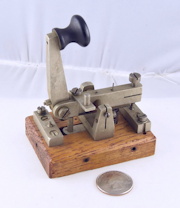 |
| Postal Style Key Used by Line Technicians |
A Portable Register With a Folding Key Protruding From the Side. Made by Gurlt |
The Gurlt Folding Lever Key Mounted on a Separate Base |
The Gurlt Key With the Lever in the UP Position |
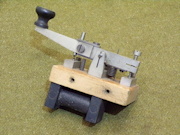 |
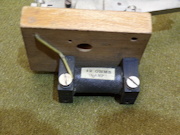 |
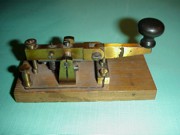 |
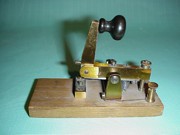 |
| Another Folding Lever Key With a Large Power Resistor Attached Under the Base |
Close-Up of the Large Power Resistor |
Another German Folding Lever Key. May Have Been Part of a Field Set |
Folding Lever Key With Lever Up |
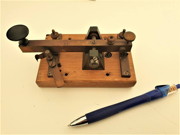 |
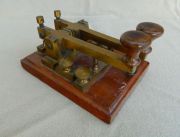 |
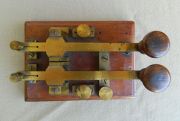 |
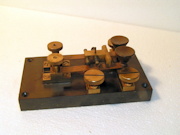 |
| German Postal Style Key With a Circuit Closer, Which Appears to be Original |
A German Key With 2 Levers But it is NOT a Cable Key |
The Lower Rear Contacts Are Separated So it Can Not be a Cable Key |
Another German Double Lever Key, Possibly Made by Siemens-Halske. Can Be Used as a Cable Key or Just 2 Keys in Parallel Depending on the Connections |
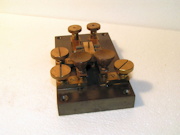 |
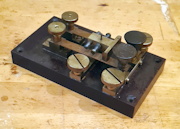 |
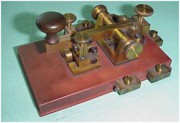 |
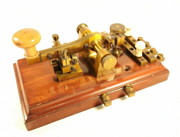 |
| Front View of the German Double Lever Key Showing the Contacts. In This Configuration the Key Operates as 2 Keys in Parallel |
In This Configuration, With the Front Contacts Connected Together, the Key Can be Used as a Spark Key |
Postal Key With Double Contacts |
Another More Elaborate Version of the Double Contact Key |
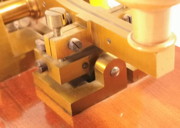 |
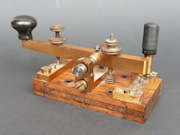 |
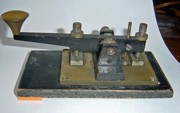 |
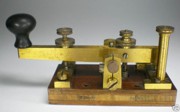 |
| Close-Up of the Double Front Contacts |
Key By Lorenz, Berlin, Taken off a Key & Register Baseboard Set |
Unknown German or Dutch Key. (PA3EGH Collection) |
Postal Key by Gurlt |
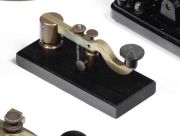 |
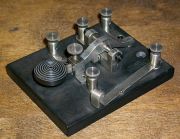 |
 |
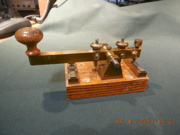 |
| Rear Pivot Camelback Key by Zimmerman, Leipzig |
Another Camelback Key by Zimmerman. (UA3AO Collection) |
Key With 2 Sets of Springs For Accurate Tension Adjustment |
Another Key with Double Adjustment Springs |
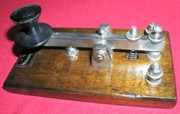 |
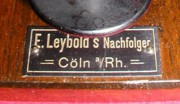 |
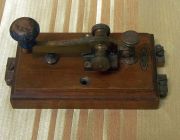 |
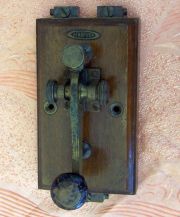 |
| Ernst Leybold Successor |
Close-up of Leybold Nameplate |
Austrian Camelback Key With a Hekaphon Radio Sticker. Ca. 1920's |
A Top View of the Austrian Camelback Showing the Hekaphon Radio Sticker |
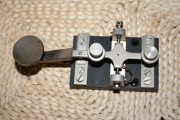 |
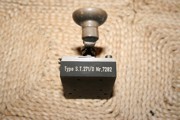 |
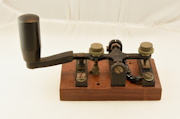 |
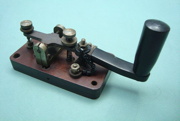 |
| Telefunken Type 271a Army Key |
Close-up of Name Stamp |
Military Key With Tall Knob Used in Airplanes. Knob Made it Easier to Handle With Gloves |
Another German Key With a Tall Knob. Maker Unknown |
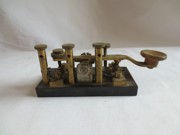 |
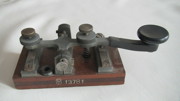 |
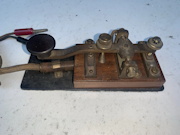 |
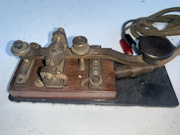 |
| Unknown Key With Tall Binding Posts |
WW1 German Army Key Type M-99 by Schuchhardt. 1918 |
Wood Based German Military Key. Maker Unknown. |
Another View of the German Military Key |
 |
 |
 |
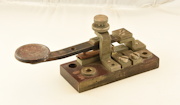 |
| Another Unknown German Military Key |
Another View of the German Military Key |
A Small German Key, Possibly From a Field Set. Schuchhardt Type T24. 1928 |
Another View of the Small German Key |
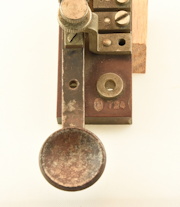 |
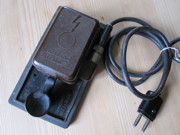 |
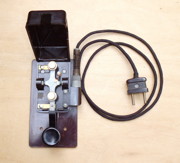 |
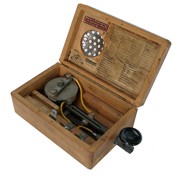 |
| Top View of the Key, Showing the Schuchhardt Symbol, Which Consists of an "S" Over an "F", for Ferdinand Schuchhardt |
Type T1 German Army Key, Ca. 1934 |
Inside the Type T1 Key |
Key & Buzzer Set by Hegra, Ca. 1935 |
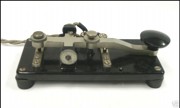 |
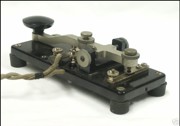 |
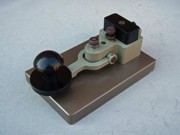 |
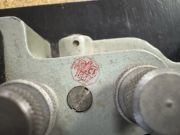 |
| Radio Key by Allei, Ca. 1938 |
Another View of the Allei Key |
German Luftwaffe Flameproof Key by BAL. US Navy Type 26003 Key Was Based on This Design |
Close-Up of the BAL (1936) Stamp on the Top of the Key |
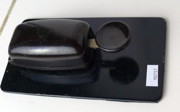 |
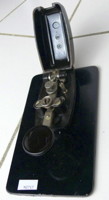 |
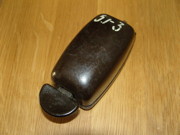 |
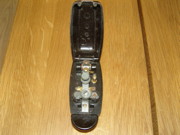 |
| German Army "Maus" Key, Made by TKP. Used by the Luftwaffe as a Training Key |
The Maus Key With the Cover Open |
Another Version of the TKP "Maus" Key. This Version Was Used in German Tanks During WW2 |
The Maus Key With the Cover Open |
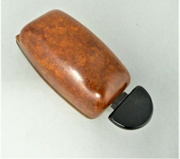 |
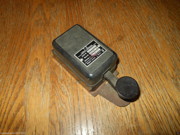 |
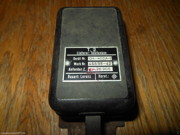 |
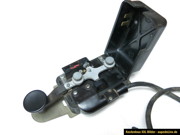 |
| The Maus Key was Also Made with a Brown Bakelite Cover |
Telefunken Model T.2. An Aircraft Key Used by German Luftwaffe During WW2 |
Close-up of the Nameplate on the Telefunken T.2 |
Inside the Telefunken T.2 |
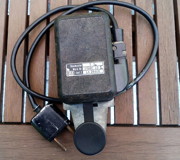 |
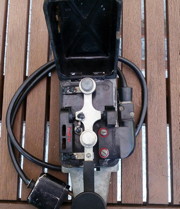 |
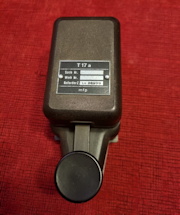 |
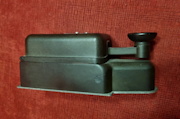 |
| The Lorenz Version of the Type T.2 Key |
Inside the Lorenz Type T.2 |
Type T 17a German Military Key by MFP |
Side View of the Type T 17a Key |
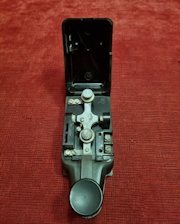 |
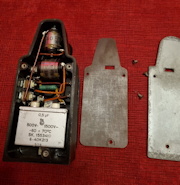 |
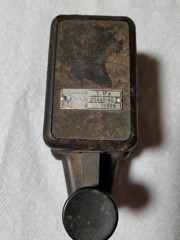 |
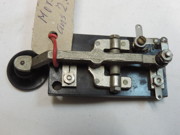 |
| Inside the Type T 17a |
The Base of the Type T 17a Key Contains a Noise Suppression Filter |
Another T 17a Key. This One Made by Lorenz |
"Upside-Down" Key. Maker Unknown. Probably Attached to the Panel of a Field Telegraph Set |
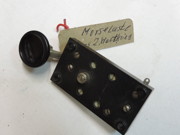 |
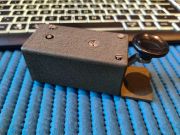 |
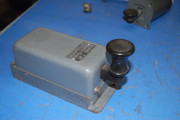 |
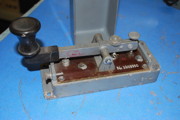 |
| Other Side of the Upside-Down Key |
The Upside-Down Key With the Cover in Place |
Type TT.1 Key |
Inside the Type TT.1 Key |
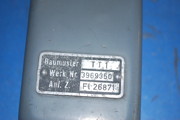 |
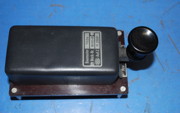 |
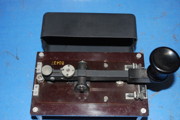 |
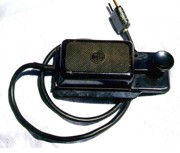 |
| Close-up of the TT.1 Label |
German Luftwaffe Type TG.2a Key. Used on the Dornier "Flying Pencil" Bomber |
Inside the TG.2a Key |
WW2 German Army Key by Hans Widmaier, Munich |
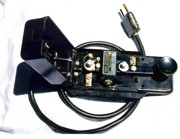 |
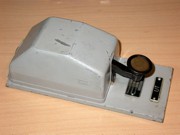 |
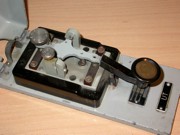 |
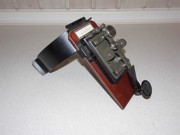 |
| Inside the Widmaier Key |
Junker Army Key With Cover |
Inside the Junker Key |
Junker Key With Leg Mount |
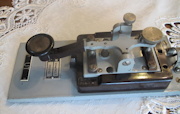 |
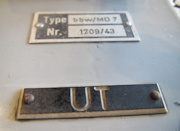 |
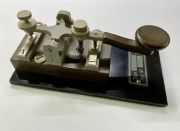 |
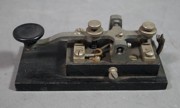 |
| Junker Type MD-7 From the German U-Boat U-256 |
The Nameplates on the U-Boat Key. "UT" Stands for "Unterwasser Telgrafie" (Underwater Telegraphy) |
German Military Key Type tf15zd |
Unknown German Military Key |
 |
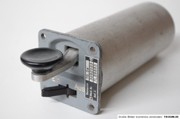 |
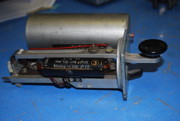 |
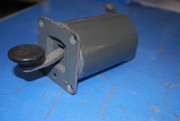 |
| Small German Military Key. Maker Unknown. Probably Used in a Military Field Set |
German Luftwaffe Type TG.5a Flameproof Key |
Inside the Flameproof Key |
Another Luftwaffe Flameproof Key |
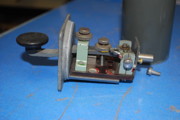 |
 |
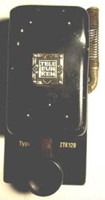 |
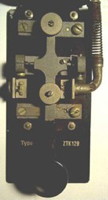 |
| Inside the Luftwaffe Key |
Another German Luftwaffe Key |
Telefunken Type ZTK-129 Army Key |
Inside the Telefunken ZTK-129 |
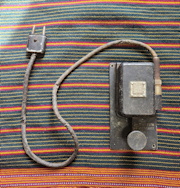 |
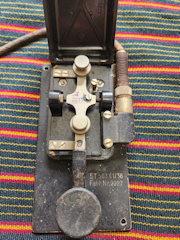 |
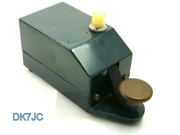 |
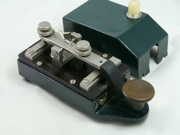 |
| Telefunken Type ST563 |
Inside the Telefunken ST563 |
Telefunken Type FuG7 |
The Telefunken FuG7 With the Cover Removed |
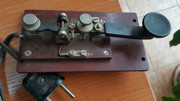 |
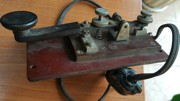 |
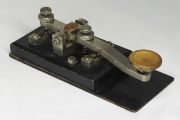 |
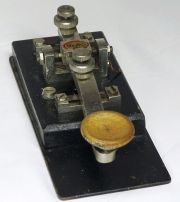 |
| Unknown German Military Key |
Top View of the German Military Key |
German Radio Key Marked "Dofro" |
Another View of the "Dofro" Key |
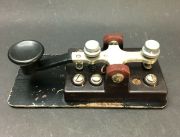 |
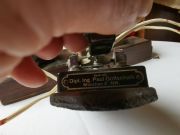 |
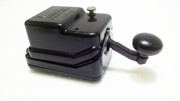 |
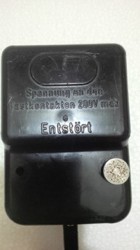 |
| German Radio Key by Paul Gottschalk, Munich |
Close-Up of the Gottschalk Nameplate |
East German Army Type MT-50 by Funkwerk Kopernick |
Close-up of the Funkwerk Kopernick Key. "Enstort" Means the Key Has an interference Suppression Filter |
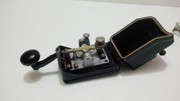 |
 |
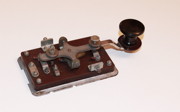 |
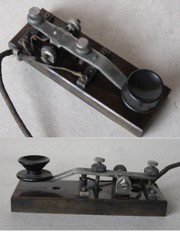 |
| Inside the MT-50 Key |
East German Army Key |
Inside the East German Key |
Unknown German Army Key |
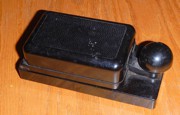 |
 |
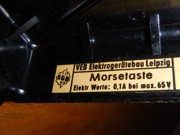 |
 |
| East German Army Key By EGB, Leipzig |
Inside the EGB Key |
EGB Label |
East German FME-33 Sideswiper by Jablonsky |
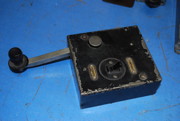 |
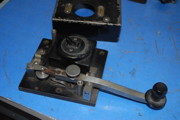 |
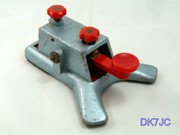 |
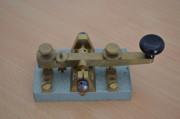 |
| Unknown Key With Switch. Similar to Danish Amplidan Keys |
Inside the German Key With Switch |
Hannes Bauer Straight Key |
Unknown German Key With Blue Hammertone Finish |
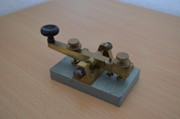 |
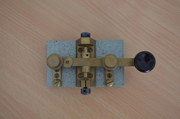 |
 |
 |
| Another View of the Blue-Base Key |
Top View of the Blue-Base Key |
A German Key Commemorating 500 Years of Postal Service |
Top View of the German Commemorative Key |
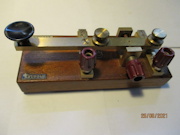 |
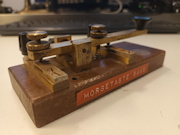 |
 |
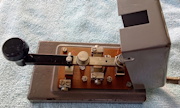 |
| Another Key by Ernst Leybold Successor |
A Different View of the Leybold Key |
German NATO Key. Maker Unknown. 1971 |
The German NATO Key With the Cover Raised |
| |
 |
|
|
| |
A Side View of the German NATO Key |
|
|





























































































































































































